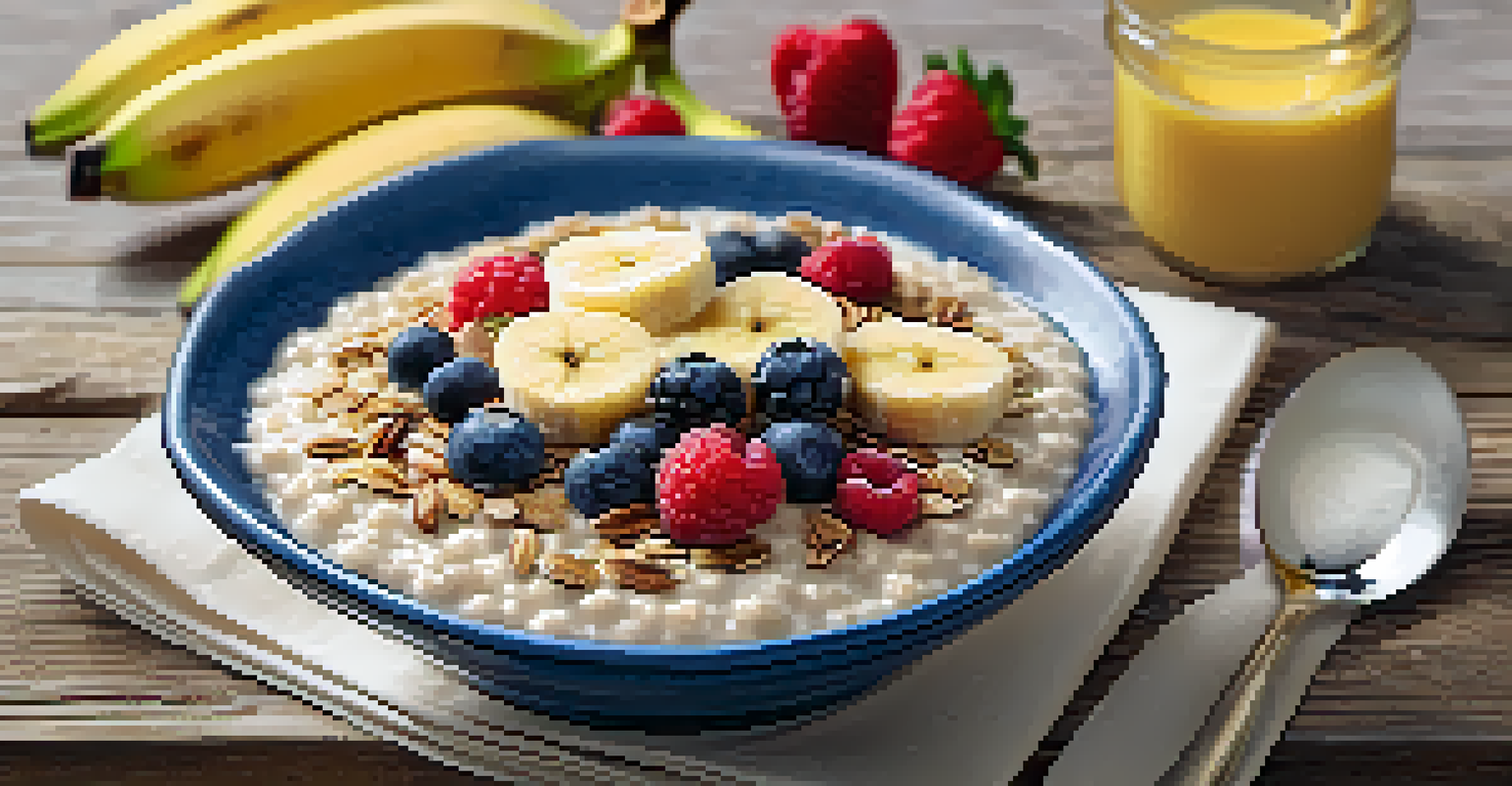The Role of Fiber in Plant-Based Nutrition and Health

Understanding Fiber: A Key Component of Plant-Based Diets
Fiber is a crucial part of plant-based nutrition, often overlooked in discussions about health. It's found in fruits, vegetables, legumes, and whole grains, serving as the backbone of a balanced diet. Not only does it aid in digestion, but it also plays a significant role in overall wellness. With its various forms, like soluble and insoluble fiber, it’s important to understand how each type contributes uniquely to our health.
Let food be thy medicine and medicine be thy food.
Soluble fiber dissolves in water and can help to lower cholesterol levels, while insoluble fiber adds bulk to our stool and promotes regular bowel movements. Think of soluble fiber as a sponge that absorbs water, helping to keep your digestive system running smoothly. On the other hand, insoluble fiber acts like a broom, sweeping through your intestines to keep things moving along without a hitch.
Incorporating a variety of fiber-rich foods can make a noticeable difference in your nutritional intake. By understanding the role of fiber, you can make informed choices about the foods you eat, ensuring that your plant-based diet is both nutritious and satisfying.
Fiber and Digestive Health: A Perfect Match
One of the most significant benefits of fiber is its positive impact on digestive health. A high-fiber diet can help prevent constipation by adding bulk to your stool, making it easier to pass. When you consume enough fiber, it promotes the growth of healthy gut bacteria, which is essential for a well-functioning digestive system.

Imagine your gut as a garden; the right amount of fiber helps cultivate the beneficial bacteria that keep it thriving. Without fiber, harmful bacteria can proliferate, leading to various digestive issues. Regularly eating fiber-rich foods can help maintain that balance, promoting a healthier gut environment.
Fiber Enhances Digestive Health
A high-fiber diet promotes healthy gut bacteria and prevents constipation, ensuring optimal digestive function.
Moreover, fiber can aid in preventing gastrointestinal disorders such as diverticulitis and irritable bowel syndrome (IBS). By keeping your digestive system functioning optimally, fiber contributes to overall health and well-being, making it an indispensable part of a plant-based diet.
How Fiber Influences Weight Management
Fiber plays a vital role in weight management, especially in a plant-based diet. Foods high in fiber tend to be more filling, which can help control hunger and reduce overall calorie intake. This satiety factor means that when you include fiber-rich foods, you may eat less without feeling deprived.
You are what you eat, so don’t be fast, cheap, easy, or fake.
Think of fiber as your diet's best friend—it's there to help you feel full and satisfied. By filling your plate with fruits, vegetables, and whole grains, you’re not just nourishing your body but also making it easier to manage weight effectively. This is particularly beneficial for those looking to maintain or lose weight in a healthy way.
Additionally, the slow digestion of fiber can lead to a more gradual release of energy, helping to stabilize blood sugar levels. This can further aid in preventing cravings, making fiber an essential ally in your weight management journey.
Fiber's Impact on Heart Health: A Natural Protector
Incorporating sufficient fiber into your diet can have remarkable effects on heart health. Studies have shown that diets rich in soluble fiber can help lower cholesterol levels, reducing the risk of heart disease. By binding with cholesterol in the digestive system, soluble fiber helps remove it from the body.
Picture fiber as a friendly guardian for your heart, working tirelessly to keep your cholesterol levels in check. Foods like oats, beans, and flaxseeds are excellent sources of soluble fiber and can be easily added to your meals. By making these small changes, you can significantly improve your heart health over time.
Fiber Aids Weight Management
High-fiber foods increase satiety, helping control hunger and reduce overall calorie intake for effective weight management.
Furthermore, a high-fiber diet is associated with lower blood pressure and inflammation, both key factors in preventing cardiovascular disease. By prioritizing fiber, you’re not just eating healthier, but you’re also taking proactive steps to protect your heart.
Boosting Immunity Through Dietary Fiber
Did you know that fiber can also play a role in boosting your immune system? A healthy gut is closely linked to a robust immune response, and fiber is essential for maintaining gut health. When you consume fiber, it acts as food for beneficial gut bacteria, helping them thrive.
Consider fiber as the fuel that powers your gut warriors—these beneficial bacteria help fight off harmful pathogens and support immune function. Foods like fruits, vegetables, and whole grains provide the necessary nutrients to keep these bacteria well-fed and active. This symbiotic relationship is crucial for maintaining overall health.
Additionally, a healthy gut microbiome can reduce inflammation, which is vital for a well-functioning immune system. By including more fiber-rich foods in your diet, you're not only nourishing your body but also enhancing your body's natural defenses.
Fiber's Role in Diabetes Management
For those managing diabetes, fiber is an essential component of a healthy diet. It helps regulate blood sugar levels by slowing down the absorption of sugar into the bloodstream. This can lead to more stable energy levels and a reduction in spikes and crashes, which can be particularly beneficial for individuals with diabetes.
Think of fiber as a steadying force in your diet, helping to keep your blood sugar levels in check. Foods high in fiber, like legumes and whole grains, can be excellent choices for those looking to manage their condition effectively. Incorporating these foods can lead to better health outcomes and improved quality of life.
Fiber Supports Heart and Immunity
Soluble fiber helps lower cholesterol and boosts immune health by nourishing beneficial gut bacteria.
Moreover, the high fiber content in these foods often leads to increased satiety, helping to prevent overeating. This is an important aspect of diabetes management, making fiber an indispensable ally in your journey toward better health.
How to Increase Fiber Intake in Your Plant-Based Diet
Increasing fiber in your diet doesn't have to be complicated. Start by gradually incorporating more whole foods, such as fruits, vegetables, legumes, and whole grains. Aim to fill half your plate with these fiber-rich options at every meal, making it easier to meet your daily fiber needs.
For example, swapping white bread for whole grain or choosing brown rice over white can significantly boost your fiber intake with minimal effort. Additionally, snacking on fresh fruits, nuts, or raw veggies can contribute to your daily fiber goals while keeping you satisfied between meals.

Don’t forget to drink plenty of water as you increase your fiber intake. This helps to prevent any digestive discomfort and ensures that the fiber can do its job effectively. With these simple changes, you can easily enhance your plant-based diet and enjoy all the health benefits that fiber has to offer.